To really make a success of make-up, salons and spas need to change the way they treat and sell, writes Eve Oxberry
While more salons and spas are coming round to the benefits of selling make-up services and products, many are still sceptical about the profit potential.
After all, women are not used to paying for professionally applied make-up in the same way they are for skincare or waxing, meaning greater investment in marketing. Meanwhile, the comparatively low price point means a lot more retail units need to be sold to make a decent profit.
However, these perceived problems can be turned into strengths (lower price points mean more impulse purchases, for example) but only if salons stop trying to force make-up into their existing mould and embrace a new set of services and retailing techniques.
“Every woman who walks into the salon is a potential make-up client,” points out Kirstie Bower, Mii expert for Gerrard International. So while it may take a while for them to get used to the idea of using and buying make-up in the salon, once they do the target market is huge.
“Link a make-up product into every single treatment, says Danielle Bookatz, merchandising manager for Jane Iredale at iiaa. “With something like a manicure, you may think, ‘how on earth am I going to get make-up on that client?’ But while their nails dry, put on a lip gloss to match their nail colour.”
Some add-ons are an easier sell. Clients leaving after a facial often want to cover the redness. Philip Lawlor, brand manager for Youngblood says a gentle, mineral brand will even boost peel and laser bookings, adding, “It makes lunch-time treatments possible as it limits the downtime."
They key to securing a make-up client, say the experts, is to convert them to your foundation. “If a woman finds a foundation she loves, she’ll stay loyal to a brand,” says Rupert Kingston, creative director at New CID Cosmetics. “Any salon that sells make-up should offer free foundation tailoring.”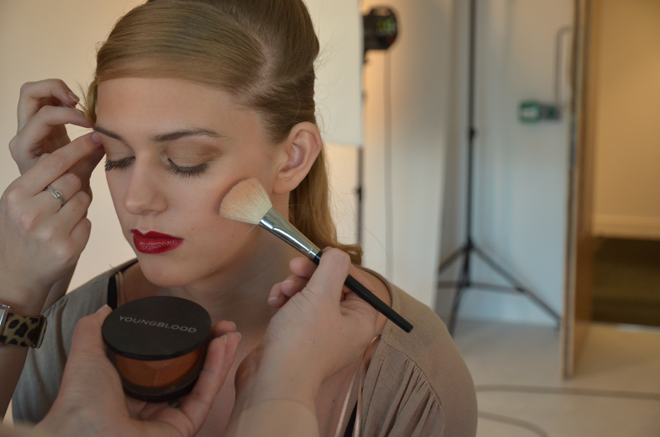
The main event
Once make-up retail moves beyond foundation, however, most agree that the one-to-one time therapists are used to for skincare prescriptions are not the most effective route. Instead, group events are the key to the volume sales needed. Many brands will send in a make-up artist to do demos and give application tips to a group of invited clients. Salons can recreate these events, sometimes on a smaller scale, hosted by the therapist most skilled in make-up.
“Group buying is more economical because you have one member of staff selling to five or ten clients,” says Kingston, who adds that the social nature of these events also make clients spend more than they would if alone. “Their friends are saying ‘that really suits you’ or ‘I’m going to buy this, what are you getting?’ so you’ll find they’ll all spend around the same amount,” he says. “It’s a very profitable way to run events as it can result in upwards of £1,000 of business.”
To hold such parties without the support of a brand rep, make-up artist Daniel Sandler suggests salons need to make sure at least one therapist is trained up to become a confident make-up artist. “Most therapists haven't really done much make-up since leaving college and don’t feel confident to take things to the next level,” he says. Bookatz also suggests empowering one therapist to drive make-up services and sales: “Make sure they’re the one going on the courses regularly and spending any spare time in the salon researching the latest trends.”
Repeat business
While informal group events with hints and tips are a great way to get clients trying and buying make-up, it’s through themed events that salons can start to secure repeat business, suggests Sandler. “You’ve got to give your customer a reason to come back and see you,” he says. “Don't give them an application lesson that covers everything but instead focus on zones such as creating a flawless base or how to define cheeks. You won't overload them with too much information in one go and they have a reason to come back."
Salons that do well with bridal or special occasion make-up also have a good chance at repeat business. “Offer brides a bounce back voucher to perfect their honeymoon, or birthday girls the opportunity to make this the year that they master the smoky eye with a make-up lesson,” says Bower.
Maximising on the seasonal nature of make-up can also tempt clients to return. “With a professional range that offers fashion collections you can offer lessons and promotions based around six-weekly collections throughout the year,” says Colin Laphan, chief executive of Artdeco UK. “Fashion collections are also the key to repeat retail. Core products will repeat but you have to wait until the client runs out.”
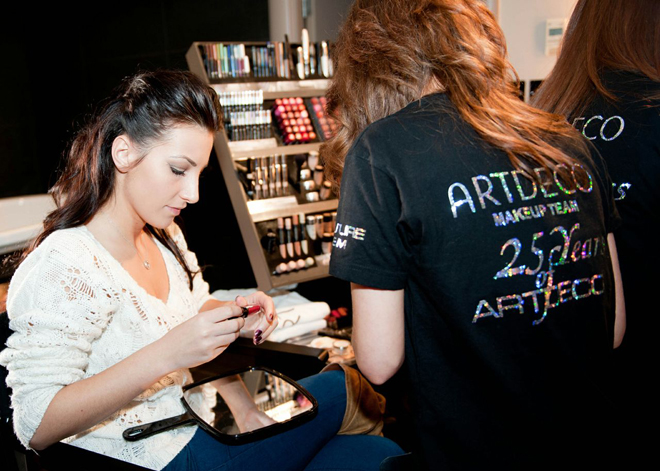 Learning experience
Learning experience
Most agree that the educational nature of events is a bigger draw for make-up than any other salon product, partly because salons face particularly fierce competition from online and department stores in this sector. “Retail in the days of the internet is all about giving people an experience and good service so a fun, informative make-up lesson is an ideal service,” says Lloyd Naaké, owner of Airbase Make-up.
Donna Tait, director of RVB Cosmetics in the UK, suggests women over 40 are the prime target for make-up lessons. “Many women of a certain age stop wearing make-up because it just ‘doesn’t work anymore’, when really, they are trying to recreate the look they wore in their younger years,” she says. “Guide them towards make-up for the type of skin they have now.”
Widening the net
Events can create new clients if existing customers bring a friend, and if you take events and marketing outside the salon or spa, make-up is an accessible way to target new groups. “Mini makeovers at local events such as bridal and fashion boutiques will open your doors to a whole host of potential clients,” says Bower. Meanwhile Naaké suggests linking with local schools and colleges to offer discounts for end of year proms.
We quizzed three salon and spa owners who do well with make-up about the secrets of their success….
Case study:
The converted make-up artist
Bellezza, Doncaster
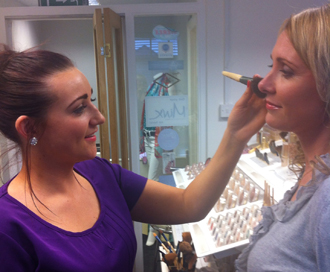 Make-up is not a service for everyone, and many therapists see it as separate to their business offering, preferring to stick to traditional therapies such as massage, facials and nails.
Make-up is not a service for everyone, and many therapists see it as separate to their business offering, preferring to stick to traditional therapies such as massage, facials and nails.
“I never wanted to do make-up,” says Shelley Elliott, owner of Bellezza salon in Bawtry, near Doncaster. “At first, I didn’t enjoy it but gave it a go because I had a lot of clients declining facial treatments because they didn’t want to walk out without make-up.”
Elliott introduced make-up to the business more than three years ago, selecting Jane Iredale because its mineral formulations can be used on skin immediately after a facial. Bellezza now covers a full spectrum of make-up services, including bridal and prom make-up, lessons, makeovers, and cleanse with mini make-up application. Elliott believes that being flexible is the key to success. “We just adapt our make-up services to suit clients,” she says. “If it’s not on the price list, we’ll create a service to suit them.”
Being a salon-only brand, Jane Iredale isn’t initially known by many of Elliot’s clients, which she says can initially present a bit of a challenge. However, once clients try the make-up she says they quickly come round to it, and she incorporates a complimentary sample into most treatments as a retail tool. “You need to maximise all the time that you’ve got with clients because if you don’t cover a broad spectrum of their needs, they will go elsewhere,” she says.
The majority of Bellezza’s make-up revenue comes from treatments, which appeal to a wide market, from teenagers learning to apply make-up correctly to ladies with problem skin in need of a gentle brand. “We do impromptu makeovers, even when we haven’t really got time,” she says. “If they see it’s quick and easy, that appeals to them.”
The bridal market is a lucrative one for Bellezza, where it’s about more than just the wedding day. “We do mothers, bridesmaids, guests – and they can turn out to be repeat customers for other treatments,” explains Elliot, adding that this is an area she’ll expand in the near future, following the opening of a nearby wedding venue, with which Bellezza has just formed a partnership.
According to Elliott, Bellezza’s revenue has seen a real boost since taking on the make-up services. “It was quite difficult to get off the ground, but I’ve become busier with facials because of the make-up offering. I’m finding it essential to boosting profit,” she says.
Case study:
The events organiser
The Spa at Rockliffe Hall, County Durham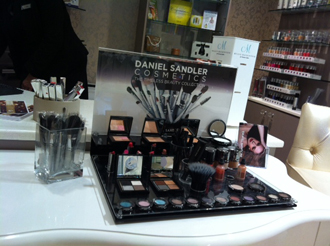 Driving revenue from make-up can be particularly tricky at a residential spa, where repeat customers are scarcer than at salons and the majority of clients come for wellness and relaxation rather than aesthetic-focused treatments.
Driving revenue from make-up can be particularly tricky at a residential spa, where repeat customers are scarcer than at salons and the majority of clients come for wellness and relaxation rather than aesthetic-focused treatments.
However, Rockliffe Hall spa manager Liz Holmes has found that running regular client events can lead to significant sales spikes and even repeat business.
“We'll often take up to £1,500 in one night on retail, which wouldn't be a lot for a skincare event but is really good for lower priced items,” she says.
Rockliffe has stocked the Daniel Sandler make-up line since it opened four years ago and found it really took off when clients were shown how to apply signature products such as Watercolour Blush in live demos.
Events also help generate a buzz. “Social media goes mad,” says Holmes, who runs events once a month. Every third month, Daniel Sandler travels to the spa to host an event himself and Holmes says this always drives interest. “Daniel has a great way of making it look easy and appealing to all clients,” she says. “He’ll pick out an older lady in the group and make her look fantastic so it never feels elite."
Rockliffe usually opens events to 80 or 90 people and charges a fee of around £10 to attend, redeemable on purchases made on the night. However, Holmes is now planning a more exclusive event for 30 of the biggest spending clients at £50 a head. “We’ll include afternoon tea, champagne and a goody bag and they’ll also get more time with Daniel,” she says.
In events without Sandler present, Rockliffe’s treatment manager Victoria Lees usually hosts, demonstrating a seasonal look or a particular skill such as smoky eye. “We often get new clients from the events if existing customers bring a friend,” says Holmes. “And clients who buy on the night often return to buy more later.”
Beyond events, Rockliffe does well with bridal make-up and make-up as an add-on after a treatment. “Some people like just a touch of colour so they're not walking out bare faced,” she says.
However, she is cautious not to push make-up retail too hard after treatments. “Spas could easily be accused of hard-sell,” she says. “Retail is logical with skincare because the client has felt it and had the benefits explained in consultation. That’s why events are so good for make-up – clients come knowing they’ll get application hints and tips and that they’ll probably buy something.”
Case study:
The enthusiastic retailer Avoca Spa, Burton-on-Trent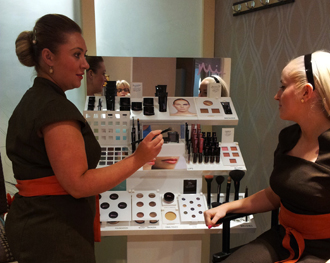 Make-up retail can be an extremely lucrative channel. With prices generally lower than for luxury skincare products, clients are more likely to make impulse purchases or treat themselves.
Make-up retail can be an extremely lucrative channel. With prices generally lower than for luxury skincare products, clients are more likely to make impulse purchases or treat themselves.
For Stacey Pickess, owner of high street salon Avoca Spa in Staffordshire, retail has so much potential that she is now investing in a new dedicated retail area, due to open later this year. “I’m on treatments a lot, but I really want to go down the route of booking out extra time for the girls to take the clients down to the retail area,” she explains.
Being from a retail background herself, Pickess is keen to develop this side of her business, and encourage these skills in her team. Her goal, she says, is to generate 50% of her make-up revenue from retail. This is a marked difference from when the salon opened its doors three years ago. “I just used to use the products I already had in my make-up bag when I ran masterclasses,” she explains. “Make-up was one of the last things I thought about investing in as the salon was opening.”
Pickess launched Mii cosmetics into the salon two years ago and says the range has proven popular with the wide demographic of clients she serves. The mineral products, for example, are popular with teenagers looking to experiment with the latest beauty trends, but also appeal to another market. “I sell a lot to busy people who haven’t got time to put a liquid foundation on. I find mineral powder is really good for a busy lifestyle.”
The make-up treatments on offer at Avoca Spa include makeovers and masterclasses, as well as bridal services and beauty parties. Pickess offers clients retail discounts on the products used in their masterclass treatment, and keeps a detailed record of the products used so that even if they don’t buy after the treatment, they can come back and easily get the exact product they used at the time.
Pickess hopes to have the new retail area of the salon open in time for the Christmas season, to capitalise on the lucrative gift market. “I’m going to do little packs with everything in,” she says. “So I’ll do an eye gift set with the eyeliner, eyeshadow and mascara. I think make-up will sell really well that way.”



